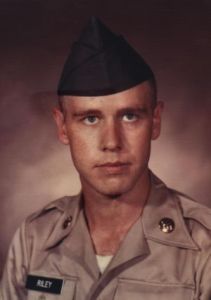Melvin Riley

Mel Riley | Photo © Paul H. Smith
Melvin C. “Mel” Riley was transferred to Fort George G. Meade in 1976 at the request of a senior intelligence officer to work on a special security vulnerability assessment team. He and Lieutenant Fred “Skip” Atwater shared adjacent desks, and within a year he was assisting Skip in the early stages of setting up the Army’s first remote viewer unit. Mel, which was referred to as Viewer 011, was thus the first official remote viewer assigned to the later RV program of the US Army – at that time still under the code name GONDOLA WISH. In late 1978 and early 1979, Mel worked full time as one of the few military remote viewers in the then renamed GRILL FLAME program.
While at GRILL FLAME, Mel Riley was sent to SRI-International in California to learn what was known about the work of a remote viewer at the time. Upon his return to Ft. Meade, he was instrumental in remote viewing projects of historical importance, such as the liberation of American hostages in Iran. Work in the Ft. Meade unit during these early years was both development and mission oriented. Mel’s efforts played an important role in creating the guidelines, standards and techniques that would shape the government’s “PSI espionage program”.

Mel Riley | Photo with frdl. Permission from Paul Smith
In 1984 he was to be assigned to the Army Remote Viewing Unit, which has now been renamed CENTER LANE. But those orders were lifted and he was sent to aerial reconnaissance units in Georgia. When the Defense Intelligence Agency took control of the Army program, it was finally possible in mid-1986 to arrange for Mel to be transferred as a remote viewer to the program now known as SUN STREAK. Mel Riley thus became the first and only person to serve twice in the military remote viewing program.
He quickly mastered the new methodology of “coordinate remote viewing” and used both this and some of his earlier techniques to provide exemplary services as a remote viewer. Some notable projects he worked on during this time were remote observation of Soviet research and development facilities, the US stealth aircraft program, hostages in the Middle East, drug trafficking detection, and many others. During his two remote viewing assignments, he not only worked as a viewer, but also as a project officer, monitor and analyst.
Mel Riley reached the end of his military career while still working as a remote viewer and retired on July 1, 1990. He continued to work as a private remote viewer for special projects carried out by other ex-military personnel in the unit. In 1996 a strong friendship developed with Lori Lambert Williams.
Mel Riley died in hospital on April 25, 2020 of complications from lung cancer.






